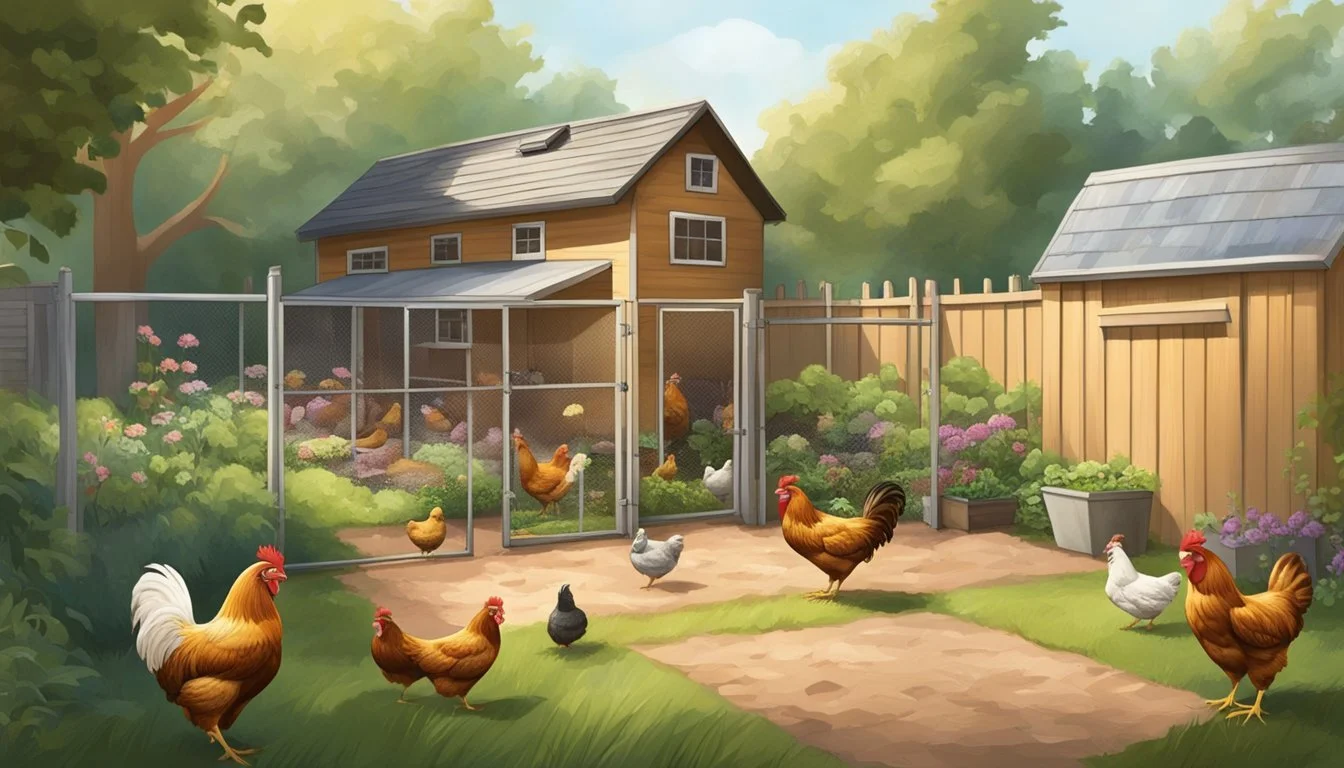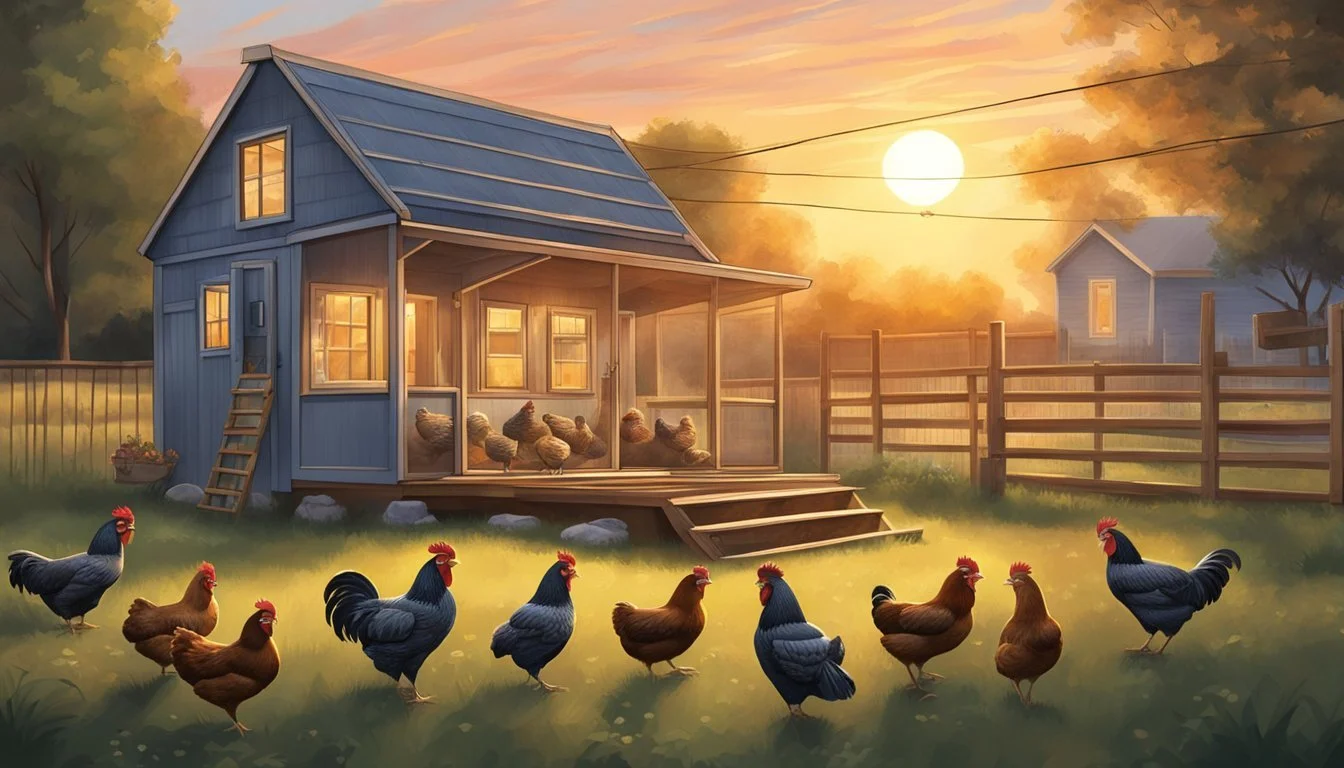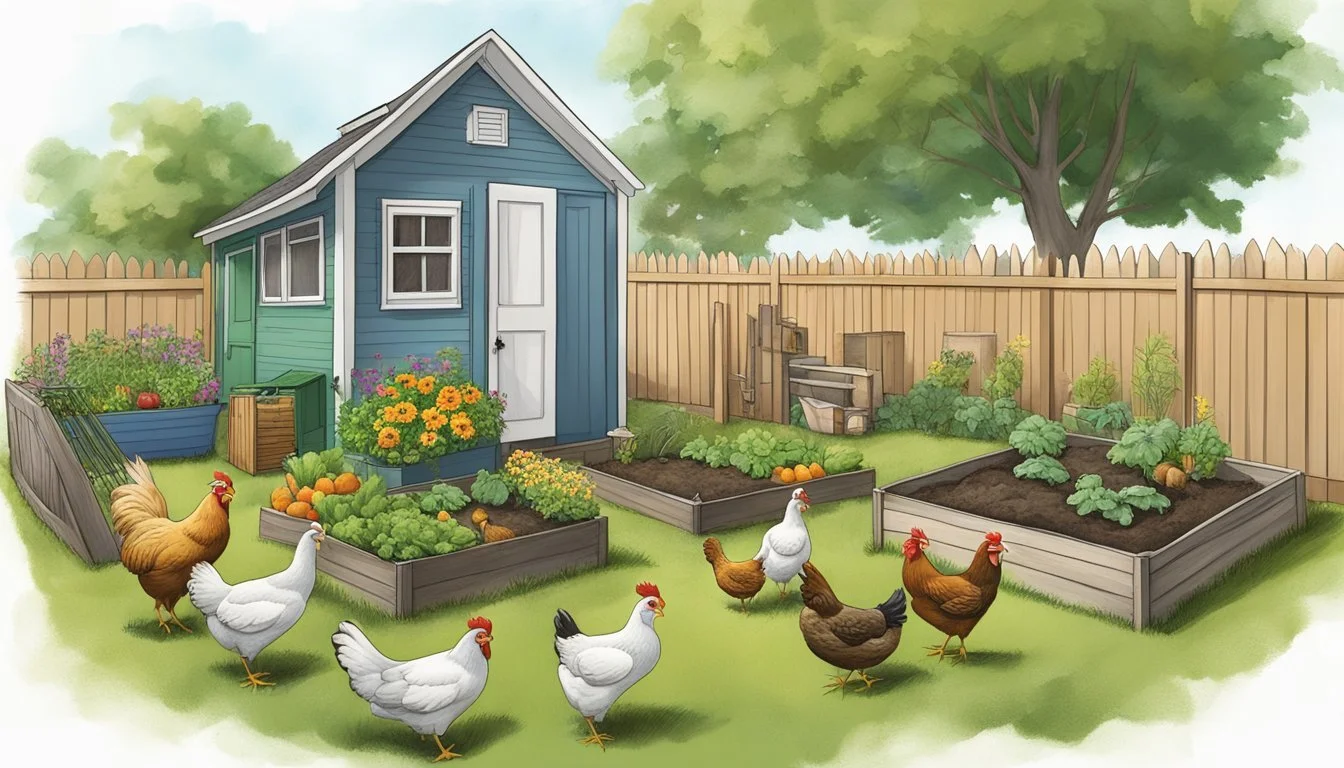Keeping Backyard Chickens in Buffalo, NY
A Guide to Urban Poultry Farming
In the city of Buffalo, New York, the practice of keeping backyard chickens (how long does chicken last?) is subject to specific regulations designed to balance urban living with the benefits of raising poultry at home. Residents who wish to embrace this self-sufficient lifestyle are required to obtain a license from the Office of the City Clerk, which comes with an annual fee. Furthermore, before chickens are brought to their new urban coop, an inspection is necessary. The coop and cage must meet the approval of an Animal Control Officer to ensure the welfare of the chickens and compliance with local laws.
Buffalo's embrace of backyard chickens reflects a larger movement towards sustainable living and local food production. Keeping chickens allows residents to produce fresh eggs, manage food waste through feeding kitchen scraps to chickens, and benefit from natural pest control. While Buffalo's policies aim to support urban chicken enthusiasts, it also enforces regulations that prohibit roosters and stipulate proper coop standards. These measures help to minimize any potential nuisance and maintain public health within the close quarters of city living.
As backyard chicken keeping gains popularity in parts of Western New York, it is important for potential chicken keepers to be well-informed about their responsibilities. Aside from securing a license and passing an inspection, they must also be mindful of coop cleanliness, predator protection, and the overall wellbeing of their feathered charges. Adhering to these guidelines ensures that both the chickens and the surrounding community thrive together in harmony.
Understanding Local Laws and Regulations
Navigating the legal landscape for keeping backyard chickens in Buffalo, New York, entails understanding municipal ordinances, nuisance and noise restrictions, state-level legislation, and the necessary permits and licenses. The following sections provide a concise overview of these elements according to local requirements.
City Ordinances in Buffalo
The City of Buffalo allows residents to keep up to 5 chicken hens in their backyards. However, there are clear restrictions prohibiting chickens in multifamily complexes such as duplexes, unless there is express written consent from the owner and agreement from all tenants.
Nuisance and Noise Restrictions
Buffalo’s chicken keepers must ensure their chickens do not become a nuisance to neighbors. This means being mindful of noise levels, as roosters are known for crowing and are likely to cause disruptions. Consequently, roosters are generally not permitted within city limits to prevent noise complaints.
State-Level Regulations
While local municipalities like Buffalo have their own laws regarding chicken keeping, they must also conform to state-level regulations. These regulations cover aspects such as the welfare, housing, and treatment of backyard chickens to ensure the safety and hygiene of both the chickens and the community.
Permit and License Requirements
For residents of Buffalo keeping backyard chickens, it's critical to check for permit requirements. While the information obtained suggests there are no specific details shared regarding permit requirements for keeping a small number of chickens, it is prudent to consult with local authorities to confirm if any permits or licenses are required to legally keep chickens in your backyard.
Setting Up Your Chicken Coop
Before one starts with building or setting up a chicken coop in Buffalo, NY, they need to pay attention to the location, design for overall safety, protection from predators, and ensuring proper fencing is in place.
Choosing the Right Location
Selecting an appropriate site for a chicken coop involves considering sunlight exposure, drainage, and convenience. An ideal location has:
Sunlight: Partial shade to shield chickens from midday heat, but also exposure to morning light.
Drainage: A high point in the yard to prevent flooding.
Accessibility: A place that allows easy access for cleaning and egg collection.
Coop Design and Safety
A coop's design contributes significantly to the well-being of backyard chickens. It should have:
Ventilation: Adequate for fresh air, yet draft-free.
Insulation: For Buffalo's varying temperatures, insulation ensures chickens remain comfortable.
Space: The coop interior should offer 2-3 square feet per chicken, and 8-10 square feet in an outdoor run.
Materials: Use sturdy materials to deter rodents and withstand harsh weather.
Predator Protection
Chickens need protection from common predators such as foxes, raccoons, and hawks. To safeguard them:
Hardware cloth: Use it instead of chicken wire for windows and fencing, to resist predators.
Solid floor: A floor can protect against burrowing animals.
Locks: Secure doors and nesting boxes with predator-proof latches.
Fencing and Security
To ensure safety within the chicken's living environment:
Fencing: A fence around the chicken run prevents escapes and deters predators. Bury the fence at least 12 inches underground.
Regular checks: Inspect the coop and fencing regularly for signs of wear or tampering.
Caring for Your Chickens
Managing backyard chickens involves a commitment to their diet, health, behavior, and the responsible collection of eggs. Proper care ensures healthy chickens and a steady supply of fresh eggs.
Daily Feeding and Nutrition
Chickens require a balanced diet to maintain their health and egg production. A mixture of layer feed, grains, and kitchen scraps can be offered. It's crucial to provide calcium supplements such as oyster shells for eggshell strength. Fresh water must be available at all times.
Chickens' Daily Feed Intake:
Chickens (adults): 1/4 to 1/3 pound of feed per day.
Chicks: Starter feed according to the feeding schedule.
Health and Disease Management
To prevent disease, keep the coop clean and provide vaccinations if recommended. Be observant of any changes in behavior as they can indicate health issues. Separation of sick chickens is essential to prevent spreading illness.
Common Diseases:
Respiratory: Symptoms include sneezing and nasal discharge.
Digestive: Look for changes in droppings or appetite.
Parasitic: Regular checks for mites and lice.
Handling and Behavior
Chickens generally exhibit social behaviors and can be tamed through regular handling. It is important to approach them in a calm manner to avoid stress. Roosters may show aggression and should be handled with extra care.
Tips for Handling:
Hold chickens gently but firmly.
Avoid chasing chickens as it causes distress.
Egg Collection and Usage
Eggs should be collected daily to ensure freshness and to encourage hens to keep laying. Store eggs in a cool, dry place and wash them just before use to preserve the natural protective coating.
Storage Guidelines:
Room temperature: Up to one week.
Refrigerated: Several weeks.
Community Relations and Responsibilities
Keeping backyard chickens in Buffalo, NY requires understanding and adhering to regulations that sustain good community relations and uphold individual responsibilities. Homeowners should be considerate of their neighbors, effectively manage waste and odors, and navigate slaughter regulations wisely to maintain a harmonious environment.
Being a Good Neighbor
In Buffalo, chicken keepers are expected to maintain a cordial relationship with their neighbors. Property owners wishing to keep chicken hens must obtain written consent from their neighbors if residing in multifamily complexes. This ensures that all residents are on board with the chicken-keeping activities. Moreover, any noise or nuisance can lead to complaints, hence coop design and placement should be carried out with neighbor considerations in mind, such as positioning coops away from shared property lines when possible.
Managing Waste and Odors
Effective waste management is crucial for reducing odors and maintaining a clean environment. Chicken keepers are responsible for regular clean-up to prevent the accumulation of waste, which can lead to nuisance and health issues. A few best practices include:
Composting: Transforming chicken waste into compost that can be used to enrich garden soil.
Routine Cleaning: Regular cleaning of coops and equipment to minimize odor and deter pests.
These practices not only handle waste responsibly but also contribute positively to the keeper's garden and local ecology.
Navigating Slaughter Regulations
Slaughter of chickens within the City of Buffalo is regulated to ensure animal welfare and that it does not become a public nuisance. Chicken owners are responsible for understanding and following these regulations explicitly. If slaughter is to happen, it should be done discreetly, maintaining respect for neighbors and community standards. Additionally, owners must ensure that the process is carried out humanely in compliance with all relevant animal welfare laws.
Dealing with Legal Issues
In Buffalo, NY, residents must navigate several legal requirements to keep backyard chickens. Compliance with city ordinances, understanding slaughter limitations, and being aware of legal consequences are essential for maintaining a flock within city limits.
Compliance with Animal Control
Residents of Buffalo must obtain a license from the Office of the City Clerk for an annual fee of $25. Before issuance, an Animal Control Officer inspects and approves the coop and cage. This ensures that chicken hens have a suitable living environment.
License Acquisition Process:
Application to the City Clerk
Payment of $25 annual fee
Inspection by Animal Control
Understanding Slaughter Limitations
Buffalo city regulations impose specific limitations on the slaughter of backyard chickens. These limitations are designed to maintain public health and safety, and residents should be familiar with these restrictions to avoid legal issues.
Key Slaughter Limitations:
Slaughter must comply with health and safety regulations
Slaughter should not cause a public nuisance
Legal Consequences of Non-Compliance
Failure to adhere to Buffalo's chicken ordinances can lead to penalties. Residents who do not comply with the permit process, housing inspections, and slaughter limitations can face legal consequences such as fines or the removal of chickens from their property.
Potential Penalties for Non-Compliance:
Fines
Revocation of license
Removal of chickens
Chicken Breeds and Selection
When selecting breeds for a backyard flock in Buffalo, NY, prospective poultry keepers should consider the climate, purpose of raising chickens (meat, eggs, or both), and local regulations.
Climate Considerations
Buffalo's climate demands hardy breeds that withstand cold winters. Breeds with smaller combs, such as the Brahma, are favored to minimize frostbite risks.
Egg-Laying Breeds
For those interested in egg production, Leghorns are a stellar choice, known for laying up to 280-320 eggs annually. They are robust and thrive in various climates.
Dual-Purpose Breeds
Dual-purpose breeds, like the friendly Brahma, provide both meat and eggs while sometimes establishing peace in a mixed flock.
Backyard Flock Dynamics
Integrating chickens into a backyard flock requires understanding their pecking order dynamics. Gentle giants like the Brahma can help maintain flock harmony.
Local Regulations
Residents must comply with Buffalo's regulations, which entail obtaining a license and ensuring proper housing inspected by an Animal Control Officer.
Here is a snapshot of suitable breeds for Buffalo:
Breed Purpose Climate Suitability Notes Brahma Dual-purpose Cold-hardy Peacekeeping in flocks Leghorn Egg-laying Adaptable High productivity
It's essential for keepers to choose based on their flock's goals and the ability to provide appropriate care throughout Buffalo's distinct seasons.
Additional Considerations
When considering keeping backyard chickens in Buffalo, NY, one must account both for the lighter side that includes fun and educational experiences, as well as the necessary adherence to municipal regulations.
Fun Aspects of Raising Chickens
Keeping chickens can be a joyous experience. They contribute to a lively backyard with their behaviors and interactions. Many owners find that chickens have individual personalities, which can be quite entertaining. The daily routine of feeding, collecting eggs, and observing the flock provides a sense of fulfillment and stress relief.
Social Creatures: Chickens often enjoy the company of their keepers and can become quite sociable.
Egg Collection: There's a unique satisfaction in collecting fresh eggs directly from the coop.
Educational Opportunities
Raising chickens presents numerous educational opportunities for individuals and families. Caring for chickens teaches responsibility and the basics of animal husbandry. Additionally, it offers a hands-on way to learn about the life cycle, nutrition, and the importance of sustainable living practices.
Responsibility: Children can learn about caring for another life.
Sustainable Practices: An understanding of local food sources and reducing carbon footprints can be gained.
Zoning and Property Restrictions
Property restrictions and zoning regulations in Buffalo must be strictly followed by anyone looking to raise backyard chickens. It is critical to confirm that your property is zoned appropriately and to understand any specific local restrictions or permit requirements.
Permits: Some areas may require a permit to keep chickens.
Distance Requirements: Coops often must be set back a certain distance from property lines and neighboring dwellings.
By considering these additional aspects, one ensures not only compliance with local regulations but also a rewarding experience with backyard chickens.
Resources and Support
For residents of Buffalo, NY interested in raising backyard chickens, a variety of local resources and support networks are available. These resources offer guidance and community backing, essential for both novice and experienced chicken keepers.
Local Chicken Communities
Buffalo New York Chicken Ordinance regulations must be adhered to, including the requirement of obtaining a license and coop inspection by an Animal Control Officer. Chicken owners can find community support and share experiences through local groups such as the Buffalo Niagara Heritage Village, which provides educational resources.
In Erie County, outside Buffalo, chicken enthusiasts may connect through agricultural extensions or local farming organizations. Nearby cities like Rochester and Schenectady also have their own groups which may offer additional insights and assistance across county lines.
Accessing Expert Advice
Residents of Buffalo seeking expert advice can contact the Office of the City Clerk or Animal Control, as they are the primary authorities on the local chicken ordinance and can offer up-to-date information and guidelines. For a broader perspective, individuals may look to state-level resources in Albany, which can provide legal backing and deeper understanding of statewide poultry regulations.
Local farms, such as Dispenza Farms in Lockport, are valuable for procuring chickens and gaining hands-on advice. Potential chicken owners are encouraged to learn from such experts, to ensure the health and safety of their poultry. It's important to leverage these resources for expert advice, including best practices in chicken care and coop maintenance.









